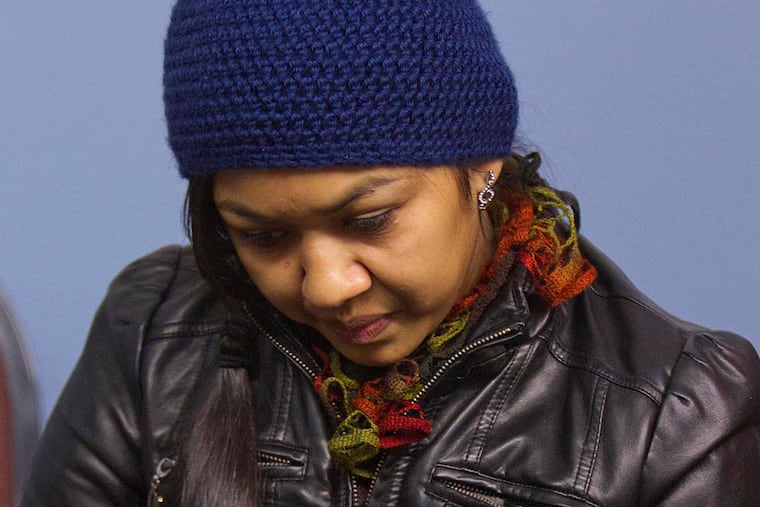Fighting deportation order, she claims sanctuary
She quit her job as a restaurant cook and let her lease lapse. On Monday, Angela Navarro, a native of Honduras, moved her family to a North Philadelphia church and took sanctuary, starting her campaign of open defiance against a decade-old deportation order.

She quit her job as a restaurant cook and let her lease lapse. On Monday, Angela Navarro, a native of Honduras, moved her family to a North Philadelphia church and took sanctuary, starting her campaign of open defiance against a decade-old deportation order.
Since September, immigrants in similar straits have sought refuge in churches in Chicago; Denver; Phoenix and Tucson, Ariz.; Portland, Ore.; and other cities. Navarro's supporters say she is the first on the East Coast.
Her stand comes as President Obama may issue executive orders this week allowing up to five million undocumented immigrants to avoid deportation. It is unclear whether Navarro would qualify.
"I am tired of living in fear that Immigration [and Customs Enforcement] can break up my family," said the 28-year-old mother of Arturo, 11, and Angela Mariana, 8, who are U.S. citizens.
Wearing a short black leather jacket and knitted blue wool cap, Navarro said she hoped spotlighting her case would convince authorities to rescind her deportation through prosecutorial discretion, or allow a chance to adjust her immigration status. Attorney Patricia Camuzzi Luber, with Reger, Rizzo & Darnall, will represent her.
The family, including Navarro's husband - a truck driver with whom she has lived for three years and wed last week - now resides in a subdivided playroom at West Kensington Ministry, a Presbyterian church at Norris Square.
Volunteers spent the weekend moving furniture; a workman raced to finish the bathroom Monday night. The family will use the church's kitchen.
While the children and her husband, Ermer Fernandez, a naturalized citizen who was born in Costa Rica, can come and go, Navarro will confine herself to the church, she said, to avoid the possibility of arrest now that she is raising her profile.
Supported by the New Sanctuary Movement of Philadelphia, an interfaith immigrant-aid group, Navarro is scheduled to speak publicly Tuesday at a news conference in Philadelphia.
"According to my understanding," she said, "Immigration has given their word that they won't enter a church."
True in practice, perhaps, but not an absolute bar to arrest, authorities said.
Asked if she would feel like a prisoner in the church, Navarro said she would pray and play guitar to pass the time. "If it ends my deportation," she said, "I'll be free to do everything afterward."
She said she was 16 and pregnant when she and her children's father crossed illegally into Texas in the winter of 2003.
Arrested immediately, she was sent to live with her parents in Philadelphia. They had permission to live in the United States under Temporary Protected Status after Hurricane Mitch devastated Honduras in 1998. TPS allows immigrants to stay in this country if it is unsafe for them to return home. The status is renewable; her parents are still here.
At a court proceeding in 2004, Navarro agreed to take "voluntary departure," which meant she would leave on her own and not be formally deported, preserving some rights if she wanted to return in the future.
But she just wouldn't go, and that turned the voluntary departure into a formal deportation.
Because of the poverty and violence in her country, she said, she would have felt compelled to leave Arturo behind, "and I didn't want to be separated from my family."
Apprehensive but resilient, she got on with her life. In 2006, Angela Mariana was born.
Navarro said she lived with her children's father for a few years, then separated. She said her children are aware of her immigration status. She had to tell them the truth, she said, when they repeatedly asked why she lacked a driver's license.
"I was afraid even to sign my name at the doctor," she said, "afraid Immigration would come and arrest me."
Among the things that she will miss, she said, is singing on Sundays in the choir at St. Joan of Arc, her Catholic church in Harrowgate.
In the 1980s, amid the civil wars in El Salvador, Guatemala, and Nicaragua, tens of thousands of Central American immigrants sought refuge in the United States. Because the United States classified them as "economic migrants" instead of people fleeing persecution, very few were granted asylum. Houses of worship, as many as 500 at the movement's peak, responded by offering shelter to many.
About 35 years later, activists frustrated by government inaction on immigration are reviving the tactic.
The Rev. Adan Mairena, 41, pastor of West Kensington Ministry, said providing safe haven for Navarro is the "right thing" to do.
"I can get all philosophical and quote Mahatma Gandhi," he said in his office, a few yards from where Navarro's family will live.
"But any world religion is against the idea of breaking families apart. I'm compelled to [help] because of my faith. Jews say, 'Love God with all your heart.' Jesus adds, 'Love your neighbor as yourself.' Look to who is in your midst, and love them.
"We have to have laws. But sometimes these laws become idols that we worship. What's more important? Following the law, or recognizing the humanity behind it?"
215-854-2541 @MichaelMatza1